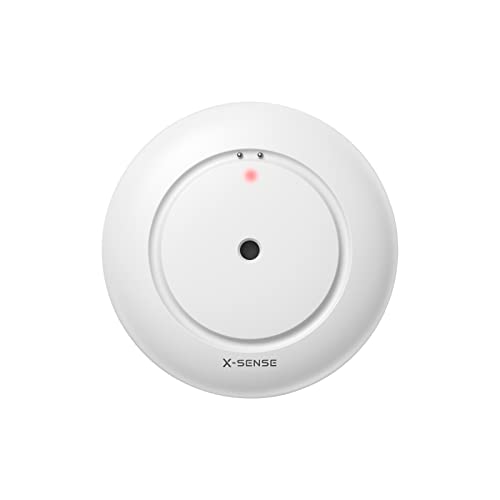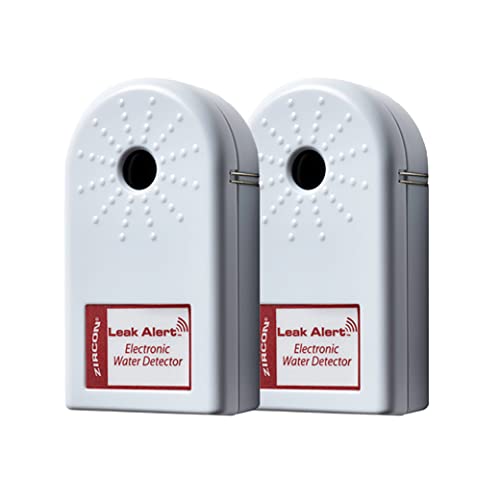In this step-by-step guide, I will provide you with a simple and effective method to determine the lifespan of a water leak detector. Water leak detectors are essential devices used to identify and prevent water leaks in various settings, such as residential homes, commercial buildings, and industrial facilities. The purpose of this guide is to assist individuals in assessing the longevity of their water leak detectors, enabling them to make informed decisions about maintenance, replacements, or upgrades. By following the outlined steps, you will gain a clear understanding of the lifespan of your water leak detector and ensure its optimal functionality.
Top-Rated Water Leak Detectors
Understanding the Water Leak Detector
A water leak detector is a device used to detect the presence of water and alert users to potential leaks in their homes or buildings. It is an essential tool for detecting and preventing water leaks, as it can help minimize property damage and prevent costly repairs. By providing early detection, a water leak detector allows users to take immediate action and mitigate the potential risks associated with water leaks.
Checking the Manufacturer's Instructions
Check the manufacturer’s instructions or user manual to find out if the lifespan of the water leak detector is specified. Locate the section that provides information on the product’s durability or longevity. Follow the instructions provided by the manufacturer to understand how long the detector is expected to last.
Researching the Product Specifications
To gather information about the typical lifespan of the water leak detector, research the product specifications online or contact the manufacturer directly. If the manufacturer’s instructions do not mention the lifespan, explore the company’s website or search for the product on reputable online retail platforms. Look for specific details regarding the durability or estimated lifespan of the device. If you are unable to find the information you need online, reach out to the manufacturer’s customer support via email or phone to inquire about the typical lifespan of the water leak detector.
Consulting Online Resources
Search online for forums or communities related to water leak detectors. Look for discussions where users share their experiences with the specific model you are interested in. These conversations can provide valuable insights into the average lifespan of the device, helping you make an informed decision.
Checking Customer Reviews and Ratings
To check customer reviews and ratings for the water leak detector, follow these steps:
- Visit an e-commerce website or other platforms that sell the water leak detector.
- Look for the product listing of the water leak detector and scroll down to find the customer reviews and ratings section.
- Read through the reviews to get an idea of how long the water leak detector has lasted for other users.
- Pay attention to any common issues or complaints mentioned by multiple customers.
- Consider the overall rating and feedback to make an informed decision about the water leak detector’s durability and reliability.
Considering Environmental Factors
Consider the environmental conditions in which the water leak detector is installed. Ensure that the humidity, temperature, and exposure to chemicals are taken into account as they can impact its lifespan. Monitor and adjust the detector’s settings accordingly to ensure optimal performance and longevity.
Contacting the Manufacturer
If all else fails, reach out to the manufacturer directly through their customer support channels. Inquire about the typical lifespan of the water leak detector and provide the necessary details such as the model number and any relevant information about your usage. For example, you could say, “Contact the manufacturer’s customer support team via email or phone and ask them about the expected lifespan of the water leak detector. Provide them with the model number and explain your usage, such as how frequently you use the detector and the conditions it is exposed to.”
Keeping Track of Maintenance and Service
Regularly maintain and service the water leak detector according to the manufacturer’s recommendations to ensure its optimal lifespan. Clean the detector’s sensors regularly using a soft cloth and mild detergent to remove any dust or debris. Inspect the detector for any signs of wear or damage, such as cracks, and replace any faulty components or parts as necessary. Finally, test the detector periodically by simulating a water leak to ensure it is functioning properly.
Key Takeaways
In conclusion, determining the lifespan of a water leak detector is crucial for its optimal performance and ensuring the safety of your property. Throughout this guide, we have highlighted the key factors that influence the lifespan of a detector, such as its technology, quality, and regular maintenance. By carefully assessing these factors, following the manufacturer’s guidelines, and conducting periodic inspections, you can accurately gauge the remaining lifespan of your detector. Remember, a proactive approach in determining the lifespan of your water leak detector will help you avoid any potential risks or failures, offering you peace of mind and protection against costly water damage.
Practical Advice
Operating Instructions: How to Use the Water Leak Detector
- Familiarize yourself with the water leak detector: Read the instruction manual thoroughly to understand its features, functions, and limitations. This will help you make the most out of the device
- Identify potential areas for water leaks: Take a walk around your home or property and locate areas where water leaks are likely to occur, such as near plumbing fixtures, water heaters, sinks, toilets, and other appliances
- Position the water leak detector strategically: Place the detector in areas where leaks are most probable, such as under sinks, near water heaters, or close to washing machines. Follow the manufacturer’s instructions for optimal positioning
- Test the water leak detector: Before relying on the detector, perform a test to ensure it is functioning correctly. You can do this by dripping small amounts of water onto the detector’s sensors and checking if it detects the moisture
- Monitor the detector regularly: Make it a habit to check the water leak detector periodically to ensure it is in good working condition. Replace batteries as needed and clean the sensors to maintain accuracy. Regular maintenance will help the detector work efficiently and provide timely alerts in case of water leaks
Frequently Asked Questions about Water Leak Detectors
Can a water leak detector be used for both residential and commercial properties?
Yes, a water leak detector can be used for both residential and commercial properties. These devices are designed to detect and alert individuals about the presence of water leaks, regardless of the type of property. They are commonly used in various settings, including homes, apartments, offices, hotels, hospitals, and other commercial establishments. Water leak detectors play a crucial role in preventing water damage, minimizing the risk of mold growth, and saving costs associated with repairs.
What are the key features to consider when purchasing a water leak detector?
When purchasing a water leak detector, there are several key features to consider. First and foremost, it is important to look for a detector that is highly sensitive and capable of detecting even the smallest leaks. This will ensure that no water damage goes unnoticed.
Another important feature to consider is the detection range of the device. It is crucial to choose a detector that can cover a wide area, especially if you have a large property or multiple areas where leaks can occur.
Additionally, the ease of use and installation of the detector should be taken into account. Look for a device that is user-friendly and comes with clear instructions for installation and operation. This will make it easier for you to set up and utilize the detector effectively.
Furthermore, battery life is an important factor to consider. Opt for a water leak detector with a long-lasting battery that can provide continuous monitoring without frequent replacements.
Lastly, it is advisable to choose a detector that has additional features such as audible and visual alarms or smartphone notifications. These features can alert you immediately when a leak is detected, allowing you to take prompt action and prevent further damage.
By considering these key features, you can ensure that you select a water leak detector that meets your specific needs and provides reliable and effective leak detection capabilities.
What is a water leak detector and how does it work?
A water leak detector is a device used to identify and locate water leaks in residential or commercial properties. It is designed to prevent water damage by detecting leaks before they become major issues.
The most common type of water leak detector is a sensor-based device. It consists of one or multiple sensors that are placed in strategic areas prone to water leaks, such as near pipes, appliances, or in basements. These sensors are highly sensitive and can detect even the smallest amount of moisture.
When the sensor comes into contact with water or detects high levels of humidity, it sends a signal to a central control panel or a smartphone app, depending on the model. This alert notifies the user that a leak has been detected.
Some advanced water leak detectors also have shut-off valves that can automatically cut off the water supply when a leak is detected. This feature helps minimize potential damage and allows for immediate action to be taken.
Overall, water leak detectors work by constantly monitoring the environment for changes in moisture levels. They help homeowners or property owners identify leaks early on, allowing for timely repairs and preventing costly water damage.







This article is a great reminder to regularly check and replace water leak detectors if needed.
Are there any specific signs that indicate a water leak detector needs to be replaced?
What is the average lifespan of a water leak detector? Does it differ for different types of detectors?
I’m glad I stumbled upon this article. Now I know what to look for when buying a water leak detector.
Does the lifespan of a water leak detector vary depending on the brand or model?
Thank you for sharing this valuable information. It’s crucial to have a reliable water leak detector to prevent damage.
It would be helpful to include some tips on how to extend the lifespan of a water leak detector.
Great article! It’s important to know how long a water leak detector will last before investing in one.
I never knew there was a lifespan for water leak detectors. This article is very informative.
Has anyone experienced a water leak detector failing before its expected lifespan?
I wonder if there are any maintenance tasks that can be done to prolong the lifespan of a water leak detector.